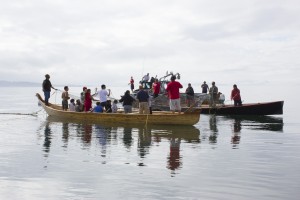 Source: Northwest Indian Fisheries, September 17, 2013
Source: Northwest Indian Fisheries, September 17, 2013
For the first time in generations, the Lummi Nation held a reef net fishery at Cherry Point.
“It feels good to say that as of yesterday, we, the Lummi Nation have been reef netting,” said Lummi Chairman Tim Ballew at a tribal event Aug. 28. “To know that tomorrow we will reef net and the days after we will too.”
The traditional reef net is suspended between two canoes. Tribal fishermen watch for the salmon to swim close to the surface, then lift the net.
“A sxwole (reef net) is a gift from our creator, therefore an inherent right,” said Al Scott Johnnie, tribal cultural administrative policy assistant. “The sockeye salmon spirit came to our people and showed them how to make the reef net from the willow and other materials that were used from long ago. This was a way of life for our people, and the method was also to allow our sockeye to go up into the river so they could replenish, because they were our extended family.”
Known in the tribal language as Xwe’chi’eXen, Cherry Point was a Lummi tribal village and traditional reef net site for hundreds of years. After the Lummi Nation signed the Point Elliott Treaty in 1855, tribal fishermen continued to reef net until about 1894, when non-Indian fish traps out-competed them, according to the 1974 U.S. v. Washington ruling that reaffirmed tribal treaty fishing rights.
A 1934 ban on fish traps in Puget Sound gave tribal fishermen renewed access to their traditional sites, but the 1939 opening of a cannery brought more competition from non-Indian fishermen who were able to reef net in more profitable locations.
In the U.S. v. Washington ruling, Judge George Boldt noted that there were 43 reef nets operating off Lummi Island at the time; none of them by tribal fishermen.
“Members of the Lummi Tribe are entitled to and shall have, as a matter of right, the opportunity to fish with reef nets in such areas,” Boldt wrote. “(W)hile non-treaty fishermen when licensed by the State to fish in reef net areas have the privilege of fishing in those areas ‘in common with’ Lummi Tribal members, they do not have the right to do so.”
North of Bellingham, Cherry Point is the site of the proposed Gateway Pacific Terminal, a coal export facility that would be the largest in North America if built. Lummi tribal leaders strongly oppose the coal terminal, because of the damage it would do to natural resources and the traditional grounds.
The pink salmon reef net fishery celebrated the tribe’s traditional use of the area. “We want our young people to remember some of the teachings of our ancestors and this way of the reef net,” Johnnie said.
